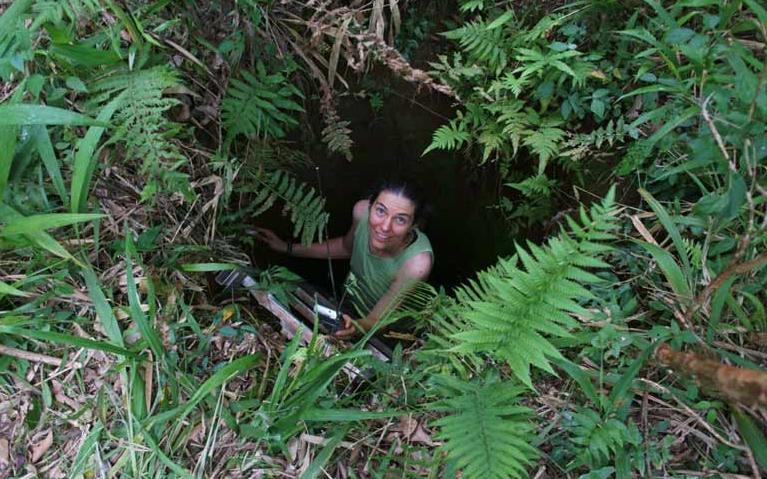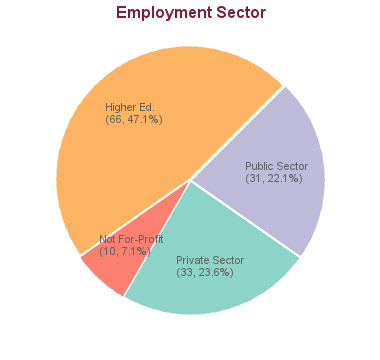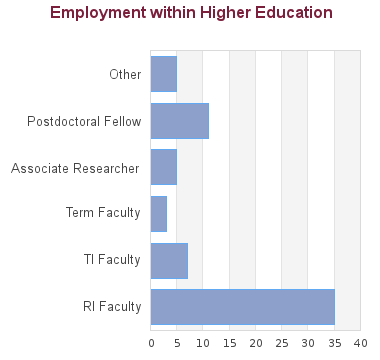
Kristina Cockle
Job Title
Research Scientist
Employer
CONICET

Review details about the recently announced changes to study and work permits that apply to master’s and doctoral degree students. Read more
Forestry graduate students learn from a dynamic and diverse group of researchers who educate and communicate how forests and the products that are created from them contribute to the well-being of all living things. The health and sustainability of forests and the people who depend on them underlies everything we do. We are among the best institutions globally in forest-related education and research and are also unique in the breadth of expertise we possess, which allows us to integrate new knowledge across many disciplines.
PhD in Forestry students can be found all over the world; they are important ambassadors for UBC Forestry and demonstrate just how diverse and international in scope the research is that is undertaken in our Faculty. We have approximately 130 doctoral students in any given year, which is about 40% of our total Forestry graduate student population. In addition to being part of the Faculty of Forestry, PhD students are also considered members of one of our three Faculty departments, based on their supervisor's affiliation.
The Faculty of Forestry offers excellent courses and cutting edge research across a spectrum of disciplines related to forestry, and opportunities for interdisciplinary learning. Graduate students work with leading scientists in state-of-the-art facilities within the Forest Sciences Centre and at any of two research forests.
We are one of the largest graduate units on campus, with over 300 students enrolled in our 7 degree programs. We attract students from around the world, with over 40 countries represented in our community. Given the global nature of modern forestry, the experience our students gain by working with colleagues from around the world is a subtle but effective means of creating the global citizens that UBC aspires to produce.
The major requirement for the PhD in Forestry is completion of a research dissertation which meets the requirements of the Faculty of Graduate & Post-doctoral Studies. Advancement to Candidacy must be achieved within 24 months of the start of studies, the requirements of which include a comprehensive examination. Course work is not required for the Forestry PhD, although many doctoral students do complete courses (either for credit or audit) as recommended by their supervisory committee.
The Faculty of Graduate and Postdoctoral Studies establishes the minimum admission requirements common to all applicants, usually a minimum overall average in the B+ range (76% at UBC). The graduate program that you are applying to may have additional requirements. Please review the specific requirements for applicants with credentials from institutions in:
Each program may set higher academic minimum requirements. Please review the program website carefully to understand the program requirements. Meeting the minimum requirements does not guarantee admission as it is a competitive process.
Applicants from a university outside Canada in which English is not the primary language of instruction must provide results of an English language proficiency examination as part of their application. Tests must have been taken within the last 24 months at the time of submission of your application.
Minimum requirements for the two most common English language proficiency tests to apply to this program are listed below:
Overall score requirement: 100
Reading
23
Writing
24
Speaking
22
Listening
23
Overall score requirement: 7.0
Reading
6.5
Writing
6.5
Speaking
6.5
Listening
6.5
Some programs require additional test scores such as the Graduate Record Examination (GRE) or the Graduate Management Test (GMAT). The requirements for this program are:
The GRE is not required.
Students admitted to the Ph.D. degree program normally possess a master's degree in Forestry or a related area, with clear evidence of research ability or potential. Transfer from the master's to the Ph.D. program is permitted under Faculty of Graduate and Postdoctoral Studies regulations. Exceptional students may be admitted directly to the Ph.D. program from the bachelor's level.
Deadline to submit online application. No changes can be made to the application after submission.
Transcript DeadlineDeadline to upload scans of official transcripts through the applicant portal in support of a submitted application. Information for accessing the applicant portal will be provided after submitting an online application for admission.
Referee DeadlineDeadline for the referees identified in the application for admission to submit references. See Letters of Reference for more information.
All applicants have to submit transcripts from all past post-secondary study. Document submission requirements depend on whether your institution of study is within Canada or outside of Canada.
A minimum of two references are required for application to graduate programs at UBC. Each graduate program determines the type of reference (e.g. academic, professional) and number of references they require which can range from 2 to 4. References should be requested from individuals who are prepared to provide a report on your qualifications for the program.
Many programs require a statement of interest, sometimes called a "statement of intent", "description of research interests" or something similar.
Students in research-based programs usually require a faculty member to function as their thesis supervisor. Please follow the instructions provided by each program whether applicants should contact faculty members.
Securing the interest of a prospective faculty supervisor is a vital step in the PhD, MSc and MASc application process, and interest must be confirmed before you submit the online application. Using the prospective supervisor list at , carefully review faculty members whom you consider to be the best match with your research interests. Make a short-list of prospective supervisors and contact them to see if they are accepting new students. Remember that faculty members receive many inquiries, so generic e-mails may not receive a response. Make your correspondence stand out: tell potential supervisors about your background and interests and how this relates to their research area. As part of your conversation with a prospective supervisor, it is important to discuss funding. UBC Forestry requires that supervisors have a minimum funding package planned for the student prior to an Offer of Admission being issued. Your online application should only be submitted after a prospective supervisor has confirmed to you that they are interested in reviewing your application.
Permanent Residents of Canada must provide a clear photocopy of both sides of the Permanent Resident card.
All applicants must complete an online application form and pay the application fee to be considered for admission to UBC.
| Fees | Canadian Citizen / Permanent Resident / Refugee / Diplomat | International |
|---|---|---|
| Application Fee | $116.25 | $168.25 |
| Tuition * | ||
| Installments per year | 3 | 3 |
| Tuition per installment | $1,875.34 | $3,294.66 |
| Tuition per year (plus annual increase, usually 2%-5%) | $5,626.02 | $9,883.98 |
| Int. Tuition Award (ITA) per year (if eligible) | $3,200.00 (-) | |
| Other Fees and Costs | ||
| Student Fees (yearly) | $1,144.10 (approx.) | |
| Costs of living | Estimate your costs of living with our interactive tool in order to start developing a financial plan for your graduate studies. | |
Applicants to UBC have access to a variety of funding options, including merit-based (i.e. based on your academic performance) and need-based (i.e. based on your financial situation) opportunities.
From September 2024 all full-time students in UBC-Vancouver PhD programs will be provided with a funding package of at least $24,000 for each of the first four years of their PhD. The funding package may consist of any combination of internal or external awards, teaching-related work, research assistantships, and graduate academic assistantships. Please note that many graduate programs provide funding packages that are substantially greater than $24,000 per year. Please check with your prospective graduate program for specific details of the funding provided to its PhD students.
This results in a net balance (any funding provided to the student minus tuition and fees) mean of $33,983 and median of $34,757.
All applicants are encouraged to review the awards listing to identify potential opportunities to fund their graduate education. The database lists merit-based scholarships and awards and allows for filtering by various criteria, such as domestic vs. international or degree level.
Many professors are able to provide Research Assistantships (GRA) from their research grants to support full-time graduate students studying under their supervision. The duties constitute part of the student's graduate degree requirements. A Graduate Research Assistantship is considered a form of fellowship for a period of graduate study and is therefore not covered by a collective agreement. Stipends vary widely, and are dependent on the field of study and the type of research grant from which the assistantship is being funded.
Graduate programs may have Teaching Assistantships available for registered full-time graduate students. Full teaching assistantships involve 12 hours work per week in preparation, lecturing, or laboratory instruction although many graduate programs offer partial TA appointments at less than 12 hours per week. Teaching assistantship rates are set by collective bargaining between the University and the Teaching Assistants' Union.
Academic Assistantships are employment opportunities to perform work that is relevant to the university or to an individual faculty member, but not to support the student’s graduate research and thesis. Wages are considered regular earnings and when paid monthly, include vacation pay.
Canadian and US applicants may qualify for governmental loans to finance their studies. Please review eligibility and types of loans.
All students may be able to access private sector or bank loans.
Many foreign governments provide support to their citizens in pursuing education abroad. International applicants should check the various governmental resources in their home country, such as the Department of Education, for available scholarships.
The possibility to pursue work to supplement income may depend on the demands the program has on students. It should be carefully weighed if work leads to prolonged program durations or whether work placements can be meaningfully embedded into a program.
International students enrolled as full-time students with a valid study permit can work on campus for unlimited hours and work off-campus for no more than 24 hours a week during academic sessions.
A good starting point to explore student jobs is the UBC Work Learn program or a Co-Op placement.
Students with taxable income in Canada may be able to claim federal or provincial tax credits.
Canadian residents with RRSP accounts may be able to use the Lifelong Learning Plan (LLP) which allows students to withdraw amounts from their registered retirement savings plan (RRSPs) to finance full-time training or education for themselves or their partner.
Please review Filing taxes in Canada on the student services website for more information.
Applicants have access to the cost estimator to develop a financial plan that takes into account various income sources and expenses.
154 students graduated between 2005 and 2013: 2 are in non-salaried situations; for 12 we have no data (based on research conducted between Feb-May 2016). For the remaining 140 graduates:


These statistics show data for the Doctor of Philosophy in Forestry (PhD). Data are separated for each degree program combination. You may view data for other degree options in the respective program profile.
| 2023 | 2022 | 2021 | 2020 | 2019 | |
|---|---|---|---|---|---|
| Applications | 55 | 59 | 44 | 63 | 37 |
| Offers | 31 | 32 | 26 | 33 | 19 |
| New Enrolment | 24 | 27 | 24 | 29 | 16 |
| Total Enrolment | 157 | 150 | 142 | 132 | 121 |
Students in research-based programs usually require a faculty member to function as their thesis supervisor. Please follow the instructions provided by each program whether applicants should contact faculty members.
Securing the interest of a prospective faculty supervisor is a vital step in the PhD, MSc and MASc application process, and interest must be confirmed before you submit the online application. Using the prospective supervisor list at , carefully review faculty members whom you consider to be the best match with your research interests. Make a short-list of prospective supervisors and contact them to see if they are accepting new students. Remember that faculty members receive many inquiries, so generic e-mails may not receive a response. Make your correspondence stand out: tell potential supervisors about your background and interests and how this relates to their research area. As part of your conversation with a prospective supervisor, it is important to discuss funding. UBC Forestry requires that supervisors have a minimum funding package planned for the student prior to an Offer of Admission being issued. Your online application should only be submitted after a prospective supervisor has confirmed to you that they are interested in reviewing your application.
These videos contain some general advice from faculty across UBC on finding and reaching out to a supervisor. They are not program specific.
This list shows faculty members with full supervisory privileges who are affiliated with this program. It is not a comprehensive list of all potential supervisors as faculty from other programs or faculty members without full supervisory privileges can request approvals to supervise graduate students in this program.
| Year | Citation |
|---|---|
| 2024 | Dr. Schild investigated recycling options for wood composites that would otherwise be discarded. She showed that the use of sensor-technologies could enable for reliable differentiation of waste wood, that could then be used to manufacture cement-bonded wood panels, facilitating a transition toward more sustainable wood material industry practices. |
| 2024 | Dr. Hua researched chemical modification routes for creating bio-based polymer materials from lignin. He developed a sustainable method to use the modified lignin in producing food packaging films and carbon fibers. |
| 2024 | Genetic differences among trees from different locations make them physically adapted to local environments, but vulnerable to climate change. Dr. Grubinger used drones, laser scanning, and multispectral imagery to quantify traits related to climate adaptation in genetic field trials of conifers, revealing novel patterns in genetic adaptation and establishing a proof-of-concept for drone phenotyping. |
| 2024 | Dr. Dort studied the genetics and genomics of plant pathogens. She used comparative genomics to discover patterns of plant pathogenicity in fungi and established CRISPR-Cas9 gene editing in an oomycete forest pathogen. Her research provides a foundation for future studies of forest pathogens and the improvement of disease surveillance strategies. |
| 2024 | Coexisting with flood-adapted forests can be a challenge for communities that are built within historical floodplains. Dr. Moran's research revealed conditions under which cottonwood forests might thrive in the presence of flood control infrastructure, and suggested workable restoration strategies for highly developed riverscapes. |
| 2024 | Dr. Wertman discovered a unique, putative mutualism between the alder bark beetle and a newly described species of fungus. Her research expands upon known bark beetle-fungus symbioses to include a hardwood tree-killing system and has implications for the future health of nitrogen-fixing red alder throughout the Pacific Coast of North America. |
| 2024 | Dr. Chadwick developed methods for deriving critical assessment data for regenerating post-harvest stands in Alberta, Canada from drone imagery. His methods provide a basis to increase the efficiency with which monitoring can occur and offer a level of wall-to-wall detail that cannot be practically obtained with traditional methods. |
| 2024 | Dr. Lane studied changes in tidal marsh vegetation and seed germination potential in coastal conservation areas of BC. She found evidence for loss and limited germination of native species, and high risk of invasion by non-native species. This research highlights a need for active management and restoration in coastal ecosystems in BC and beyond. |
| 2024 | Dr. Loughnan studied climate change impacts on the timing of life history events, including the start of spring in forests. She found important relationships with environmental cues, like temperature, and evolution in how native woody species are responding. Her work has applications in conservations and management of forests across North America. |
| 2024 | Dr. Zhao developed ecological models to predict forest tree species' fundamental climate niche and productivity. Her innovative studies offer essential insights into forest adaptation strategies such as conservation or assisted migration in response to climate change. |
Forestry offers advanced study in natural and social science, management, and economic aspects of forestry and wood science, in an interdisciplinary setting.
Departments/Programs may update graduate degree program details through the Faculty & Staff portal. To update contact details for application inquiries, please use this form.

Take a break from studying with opportunities at your fingertips. Whether you want to settle down in a café or take your research outdoors, we have a place for you.